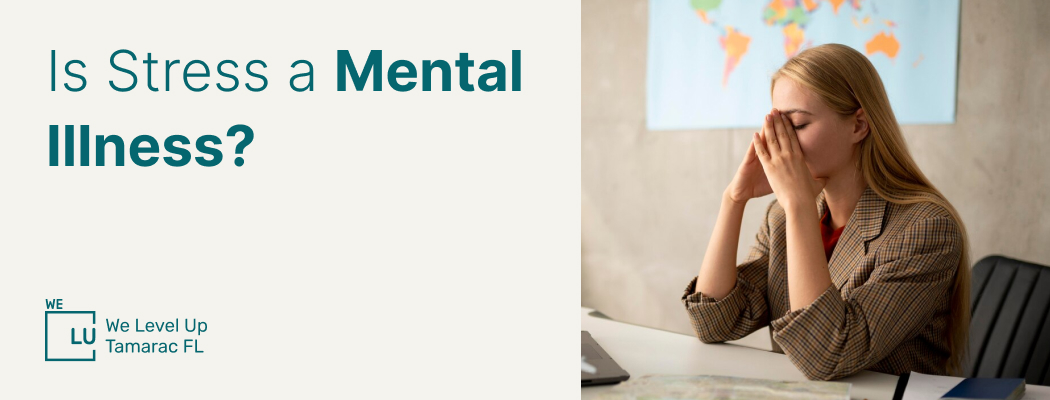When experiencing intense reactions to typically unpleasant life circumstances, people often wonder: Is stress a mental illness? Stress is a normal neurophysiological response to a situation that a person can not control. On its own, it is not a mental illness, but when experienced frequently, it increases the risk for mental health conditions.
Due to many similar terms, there’s a lot of confusion about stress and its connection to mental health issues. We at We Level Up Tamarac FL, think it’s important to be well-informed and make educated decisions about mental health. With this article, we are offering answers to questions like what the relationship between stress and mental illness is, can stress cause mental illness, how can stress cause mental illness, and many more.
Skip to:
Understanding Stress
A common mistake when discussing stress is not distinguishing stress from stressors. While stress is a response, stressors are different triggers for the reaction. Typically, stressors are situations outside of your control, and more often than not, they are related to adverse outcomes and threaten your well-being. It’s important to note that stressors can also be positive events – like childbirth or weddings.
What distinguishes stressors from non-stressors is how we feel about a situation. One person may perceive the same event as dangerous, while another may see it as non-threatening. Both the causes and intensity of stress are susceptible to individual differences.

Stress is a reaction that prepares the body for action. Some authors insist on the difference between physical and psychological stress. Physical stress is a response to bodily threatening physical stressors, like extreme temperatures. Psychological stress, on the other hand, is a more complex reaction of the organism that involves a sense of inescapability or uncontrollability, and responses differ due to people’s patterns of thinking and behaving.
When we’re under stress, our bodies and minds work overtime to meet the demands of the situation. With that in mind, the relationship between stress and mental illness is becoming more evident.
Should We Classify Stress as a Mental Illness?
A short answer to this question is no, but the relationship between stress and mental illness certainly requires more explanation.
When stress occurs within a few minutes or a few hours of an event, lasts a short period of time, and is quite intense, we call it acute stress. A certain amount of stress in the short term can be helpful. As it puts people in a state of alertness, it can positively contribute to meeting deadlines or preparing a presentation.
On the other hand, so-called chronic stress lasts for prolonged periods of time and keeps coming back. It can happen due to a repeated sense of being under pressure or daily difficulties (like living in poverty or being a carer). This sort of stress increases the risk of both physical and mental problems.
Keep in mind that even little stresses, when they persist over time, can have negative effects on your mental health. Knowing this, we should learn how stress can cause mental illness and keep an eye out for symptoms of debilitating stress.

While stress itself isn’t a mental illness, its effects can be profound. We Level Up Tamarac FL can provide you with more comprehensive insights on this topic and support you when you decide to learn how to handle stress better.
Signs of Stress-Induced Mental Health Issues
Stress manifests itself with physical, cognitive, emotional, and behavioral symptoms. Usually, there’s more than one signal of stress, and often, it’s difficult to determine when these signals become alarming and point to mental health issues.
Frequent physical symptoms include:
- Headaches and muscle aches.
- Muscle tension and jaw clenching.
- Fatigue, exhaustion, and trouble sleeping.
- Stomach problems (indigestion or heartburn, nausea, diarrhea or vomiting).
- High blood pressure and rapid heart rate.
- Loss of sex drive.
Typical cognitive symptoms can be:
- Memory issues.
- Problems with concentration.
- Constant worrying.
- Focus on negativity.
- Difficulties making decisions.
Some of the emotional symptoms pointing to stress are:
- Moodiness, irritability, and agitation.
- Unhappiness, depressive states.
- Nervousness and anxiety.
- Feelings of loneliness.
Behavioral symptoms can be:
- Appetite and sleep pattern changes.
- Neglection of responsibility.
- Smoking, alcohol or drug abuse.
- Nervous acts (like nails or lip biting, hair pulling, fidgeting).
Get Help. Get Better. Get Your Life Back.
Searching for Accredited Dual Diagnosis Mental Health Centers Near You?
Even if therapy failed previously, or are in the middle of a difficult crisis, we stand ready to support you. Our trusted behavioral health specialists will not give up on you. When you feel ready or just want someone to speak to about counseling alternatives to change your life call us. Even if we cannot assist you, we will lead you to wherever you can get support. There is no obligation. Call our hotline today.
FREE 24/7 Dual Diagnosis Mental Health Services HotlineThese signs do not necessarily point to stress, so you should pay attention to the context in which these symptoms occur. It is different if the indications have been present for a while and align with your personality (nail biting can be related to higher scores on the neuroticism personality trait) or if they just recently started. If they seem unusual (someone suddenly started fidgeting), or if they relate to a specific period of your life (alcohol experimenting during college, for example).
When trying to conclude whether these signals are normal stress reactions or warning signs of bigger mental health issues, you should pay attention to the intensity and duration of these symptoms.

The Relationship Between Stress and Mental Illness
According to yearly surveys by the American Psychological Association, an alarming number of adults report that stress impacts their daily functioning, and more than a quarter state that their stress level is such that they can’t function.
As mentioned before, prolonged chronic stress is a risk factor for mental health problems. Although stress poses a risk factor, people often wonder – can stress cause mental illness? Some studies point to a positive answer, although mechanisms that explain how stress can cause mental illness are not fully explained.
A frequent question in research is what mental illness can stress cause, and repeated studies have shown a link between stress and depression/anxiety disorder. These results were repeated in multiple different communities.

End the Emotional Pain. Get Your Life Back.
Feeling Depressed, Anxious or Struggling with Mental Health Illness? Get Safe Comfortable Mental Health Dual Diagnosis High-Quality Therapy From Counselors That Care. Begin Your Recovery Now.
Hotline (855) 940-6125Can Stress Cause a Mental Illness?
Stress can have an impact on the onset and course of psychiatric disorders, including major depressive disorder, bipolar disorder, and posttraumatic stress disorder. It seems unfair to say that stress can cause mental illness directly, but it sure imposes a big risk of triggering or worsening a person’s mental state. Ongoing stress without adequate support or intervention can escalate into mental health issues.
Knowing that stress can cause mental illness can tremendously change the approach to preventing and treating mental disorders, but the relationship between stress and mental illness is not simple. Many are dedicated to explaining mechanisms and mediators in this relationship.
How Can Stress Cause Mental Illness?
Stress can act as a trigger or even be a direct cause of mental health problems if present long enough or accumulated. When stress is chronic and excessive, it might lead to maladaptation, which then contributes to the development of disorders, especially if there is a genetic vulnerability.
To understand how can stress cause mental illness, scientists have investigated brain activity. Stress impacts the neural response of the prefrontal and frontal cortex, which is linked to depression. Although this connection is not fully investigated, it is speculated that chronic psychological stress may influence brain plasticity (or neuroplasticity – a situation when the brain is rewired to work in a different way from how it previously functioned), which in turn causes biased taught and behavioral patterns.
Neurotransmitters like dopamine and serotonin also play a part. Stress might increase concentration, but it can also impact your emotional state.
First-class Facilities & Amenities
World-class High-Quality Mental Health Services & Behavioral Health Substance Abuse Treatment
Rehab Centers TourRenowned Mental Health Centers. Serene Private Facilities. Inpatient Rehab Programs Vary.
Mental Health Helpline (855) 940-6125Proven recovery success experience, backed by a Team w/ History of:
15+
Years of Unified Experience
100s
5-Star Reviews Across Our Centers
10K
Recovery Successes
- Comprehensive Dual-Diagnosis Treatment
- Complimentary Family & Alumni Programs
- Coaching, Recovery & Development Events
- Comfortable Onsite Medical Detox Center
What Mental Illness Can Stress Cause?
Stress can cause different mental illnesses, and here are only a few:
Anxiety disorder – Anxiety happens for a variety of reasons. It’s a state of worry about events you do not feel confident about, which can produce a sense of lingering fear. Anxiety disorder, however, is the experience of a persistent, excessive, and overwhelming worry that impacts your day-to-day life negatively. Exposure to stressful environments or events is a risk factor for the development of different types of anxiety disorders. For those seeking relief from such conditions, trying the anxiety disorder treatment Florida residents sometimes attend could be an important step toward managing and potentially overcoming this persistent worry and fear.
Depression – Depression is a severe mood disorder characterized by prolonged negative feelings like sadness and a lack of interest in things a person previously enjoyed. Major depressive disorder (MDD) can be triggered by the accumulation of stress memories in the past, implying that early dealing with stress before it accumulates can somewhat prevent depressive disorders.
PTSD – Post-traumatic stress disorder is a condition triggered by a terrifying event, whether one participated in it or just witnessed it. The intensity of stress related to the event is so high that it lingers and can easily be triggered by anything reminding the person of the traumatic event, meaning there’s a generalization of stress memories.
Substance abuse (alcoholism, drug addiction) – A person dealing with stress might reach out to different means in their efforts to deal with it. Not all developed coping mechanisms are good; substance (ab)use is a good example. You might reach out to, for instance, alcohol to get relief after a stressful day, but once it turns into a regular occurrence and you feel you can’t cope with stress without a drink or two, we might be talking about addiction.
Causes and Risk Factors for Stress
Simply put, causes of stress are different physical and psychological stressors – events that require making an effort, both mentally and physically, to resolve. However, exposure to stressors does not necessarily mean you will have stress as a reaction. Risk factors for stress might come from within a person or from their environment.
World-class, Accredited, 5-Star Reviewed, Effective Mental Health Dual Diagnosis Programs. Complete Integrated Inpatient Rehab with Free Post Discharge Therapy Planning.
CALL (855) 940-6125End the Emotional Pain Rollercoaster. Gain Stability & Happiness Through Recovery Treatment. Start Mental Health Counseling Today. Get Free No-obligation Guidance by Behaviroal Health Specialists Who Understand Mental Health Recovery.
Internal factors:
- Personality traits — Certain personality traits impact how we perceive the world. Higher neuroticism, for example, impacts our sensitivity to outside stimuli and the ability to recognize events as threatening or not. Consequently, people higher on this trait might experience more stress than those lower on the neuroticism trait.
- Existing mental health state — When talking about stress and mental illness, one usually thinks only of stress leading to mental health problems. Still, the link goes both ways – mental health problems can impact the stress levels a person is experiencing.
- Previous experience and resilience — Our previous experiences shape our future responses to events. If a person struggled or failed to manage stress in the past, they might be less capable of dealing with stressors due to their learned helplessness.
Some external factors:
- Difficult life circumstances — Living in poverty or lacking access to certain basic commodities imposes daily stressors that can have multiple effects due to their impact on many aspects of a person’s life.
- Choice of profession — Not everyone has the luxury of choosing their profession, and life sometimes imposes stressful social roles on people (like the role of caregiver). A profession can be very mentally, physically, or emotionally demanding. We also all know that certain professions have higher risks for health and safety, introducing many stressors into daily life.
The social environment is an interesting stress-related factor as it can be both protective and a risk factor. When people have a strong and reliable social network, the environment has a protective or buffering effect. If, however, the social network is missing or is toxic, we are talking about a risk factor for stress.

Stress Management and Prevention of Its Negative Impact on Mental Health
Eliminating stress from your life is practically impossible, as there will always be new challenges to address. Instead of striving to eliminate it, people should learn to manage it and develop healthy coping mechanisms to deal with it.
Here are a few practical tips for how to prevent and manage stress and minimize its negative impact on mental health:
- Identify your stress triggers – Knowing what makes us feel stressed is the first step towards tackling it. Try tracking your mood; when you feel stressed, note it. You might decide to avoid this stressor if and when it’s possible or reduce your exposure to it. If it’s related to a task, you might seek others’ assistance to reduce the impact of this stressor.
- Set boundaries – Setting and communicating your boundaries can prevent future stressors on your job or in social circles. You can discuss when a task is something you can not address on your own, when you need more time, or when you simply cannot follow through on a previously agreed-upon engagement. It’s also important to set boundaries with friends and family (especially with toxic members) in terms of topics you are willing to talk about or time you can dedicate to them.
- Develop a support system – A strong support system is a protective factor. Reaching out to a friend or a family member and sharing your feelings can bring relief. They might have been in similar situations and can relate to what you are going through or even offer guidance. Your social network can also support your healthier choices and help you stay on track.
- Make one health-related commitment (it could be a better diet, better sleep schedule, or physical activities) – Small changes in your daily routine, like having regular walks, cutting down on caffeine, or going to bed at a regular time, can go a long way. All of this helps the body combat the negative impacts of stress and introduces stability into your life.
- Try getting a hobby. Enjoyable activities can act as a buffer and induce the production of endorphins. Hobbies, especially when creative, become one’s outlet to express dissatisfaction or frustration. They also create a sense of achievement that can, to an extent, compensate for negative feelings caused by stress.
- Seek additional help – If you keep feeling overwhelmed, request help from a licensed professional. Psychologists are trained to help you develop coping mechanisms to manage stress more effectively and to improve your overall mental health. Knowing that stress can cause mental illness, it’s advisable to react early to signs of intense or persistent stress before it becomes too damaging. The first step in seeking external help could be informing yourself about different available options for addressing stress-related illnesses. Depending on your needs, you can go with the BPD treatment Florida experts recommend or some other type of treatment options.
Professional Help
Seeking support from friends and family can be helpful, but sometimes it’s not enough. Stress can feel overwhelming if you haven’t learned effective ways to deal with problems and have had tough experiences growing up. Also, dealing with stress in a timely manner is important because letting it build up over time can lead to mental health problems, requiring even more help.
Trained and licensed professionals like the ones at We Level Up Tamarac FL can provide personalized therapy and support. Getting expert help is additionally simplified for users of Blue Cross Blue Shield Florida Mental Health coverage or those relying on Aetna Mental Health coverage Florida locals often use. However, even if you have some other health insurance, please get in touch with our representatives, and we will do our best to provide you with the services you might need.
FAQ
- Is stress a mental illness? No, stress is not a mental illness, but there is a positive relationship between stress and mental illness, meaning that one is often followed by the other.
- Can stress cause mental illness? If intense, prevalent, and chronic, stress can both trigger or worsen a mental illness.
- What mental illness can stress cause? Some of the more frequent stress-related mental disorders are mood disorders (including depression), anxiety disorder, PTSD, and substance abuse.
- How can stress cause mental illness? The exact mechanisms explaining the relationship between stress and mental illness are still unknown. Still, it’s known that the central nervous system plays an important part and that risk factors have their contribution.
So, What’s the Verdict – Is stress a Mental Illness?
The answer to the question “Is stress a mental illness?” might be a negative one, but it’s important to remember that there’s a link between stress and mental health and that stress can cause mental illness or trigger people’s mental health issues. Pay attention to early signs of the negative impacts of stress on mental health and seek support when needed. Asking for help isn’t easy, but you will feel empowered to do so after learning how to overcome the stigma of mental illness in Florida. Small changes can be introduced in life to help combat stress effectively, but professional help will additionally empower you with healthy coping mechanisms and long-lasting advice.
Experience Transformative Recovery at the We Level Up Treatment Center.
See our authentic success stories. Get inspired. Get the help you deserve.



Start a New Life
Begin with a free call to a behavioral health treatment advisor. Learn more about our dual-diagnosis programs. The We Level Up treatment center network delivers recovery programs that vary by each treatment facility. Call to learn more.
- Personalized Care
- Caring Accountable Staff
- World-class Amenities
- Licensed & Accredited
- Renowned w/ 5-Star Reviews
We’ll Call You
Search We Level Up Tamarac FL for Is Stress a Mental Illness? Topics & Resources
Sources:
American Psychological Association (2013). How stress affects your health. [online] American Psychological Association. Available at: https://www.apa.org/topics/stress/health.
Apa.org. (2024). Available at: https://www.apa.org/news/press/releases/2022/10/multiple-stressors-no-function/.
Friedman, W. (2015). Types of Stress and Their Symptoms – Dealing with Stress and Anxiety Management ?EUR” Coping Mechanisms from MentalHelp.net. [online] Mentalhelp.net. Available at: https://www.mentalhelp.net/blogs/types-of-stress-and-their-symptoms/.
Richter-Levin, G. and Xu, L. (2018). How could stress lead to major depressive disorder? IBRO Reports, [online] 4, pp.38–43. doi:https://doi.org/10.1016/j.ibror.2018.04.001.
Schneiderman, N., Ironson, G. and Siegel, S.D. (2005). Stress and health: Psychological, behavioral, and biological determinants. Annual Review of Clinical Psychology, 1(1), pp.607–628. doi:https://doi.org/10.1146/annurev.clinpsy.1.102803.144141.
Tafet, G.E. and Nemeroff, C.B. (2015). The Links Between Stress and Depression: Psychoneuroendocrinological, Genetic, and Environmental Interactions. The Journal of Neuropsychiatry and Clinical Neurosciences, 28(2), pp.77–88. doi:https://doi.org/10.1176/appi.neuropsych.15030053.
van Praag, H.M. (2004). Can stress cause depression? Progress in Neuro-Psychopharmacology and Biological Psychiatry, [online] 28(5), pp.891–907. doi:https://doi.org/10.1016/j.pnpbp.2004.05.031.





